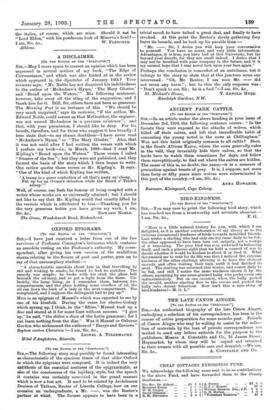SIR,—The following story may possibly be found interesting as characteristic
of the spacious times of that older Oxford in which the epigrams were composed. It is indeed the very antithesis of the essential neatness of the epigrammatic, as also of the conciseness of the lapidary, style, but the speech it contains was certainly conceived in the grand manner which is now a lost art. It used to be related by Archdeacon Denison of Tatham, Rector of Lincoln College, how on one occasion an undergraduate, a Mr. —, was the Rector's partner at whist. The. former appears to have been in a trivial mood, to have talked a great deal, and finally to have revoked. At this point the Rector's slowly gathering fury burst its bounds, and he took up his parable thus :—
" Mr. —, Sir, I desire you will keep your conversation to yourself. You have no sense, and very little information. Advantages, it is true, you have had at this University, but far beyond your deserts, for they are small indeed. I desire that I may not be troubled with your company in the future, and it is my earnest hope that I may never look upon your face again."
Perhaps the conclusion is somewhat of an anticlimax, but it belongs to the story to state that at this juncture some one
intervened : " Oh, Mr. Rector, I am sure Mr. — did not mean any harm " ; but to this the only response was :
" Don't speak to me, Sir ; he is a fool."—I am, Sir, &c.,






















































 Previous page
Previous page